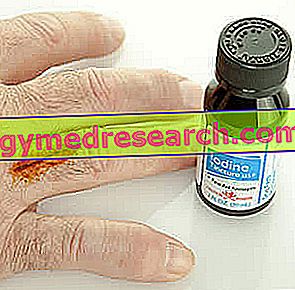Generality
By definition, the iodine dye consists of a hydroalcoholic solution (mixture of ethanol and water) containing 7% m / V of iodine and 5% m / V of potassium iodide. However, there are also hydroalcoholic solutions for oral use with lower iodine concentrations.

Even today, iodine tincture is considered a good disinfectant remedy; for this reason it is still widely marketed.
Examples of medicinal specialties containing Iodine Tincture
- Iodine Almus®
- AFOM® Iodine
- Iodine Farve®
- Iodine Sella®
Indications
For what it uses
The use of iodine tincture (7% / 5%) is indicated for the disinfection of intact skin for occasional treatments.
Furthermore, hydroalcoholic solutions are available for oral use containing lower concentrations of iodine (2% m / V iodine and 2.5% m / V potassium iodide), the use of which is indicated for the disinfection of the oral cavity and for the treatment of iodine deficiency in the event of increased need or reduced absorption.
Warnings
The use of iodine tincture - both topical and oral - must not be carried out for long periods of time, since it can give rise to sensitization phenomena and irritation of the treated area.
Since iodine can influence the activity of the thyroid gland, its use must be carried out with extreme caution in patients suffering from thyroid and / or goiter pathologies.
The use of iodine dye in pediatric age should be carried out only in cases of actual need and only under the strict control of the doctor.
Interactions
Tincture of iodine must absolutely not come into contact with acetone, since the latter is able to interact with iodine forming an irritating compound.
Tincture of iodine for oral use should not be used in patients already on lithium carbonate or amiodarone therapy, as there is an increased risk of onset of thyroid gland dysfunction.
Normally, if used externally, iodine should not interfere with the activity of other drugs taken systemically.
However, it is always a good idea to inform your doctor if you are taking any kind of medication, including prescription free medicines and herbal and homeopathic products.
Side effects
Following the use of iodine tincture, different types of side effects may occur, although not all patients experience them.
The type of adverse effects and the intensity with which they occur depend on the sensitivity of each individual to the same iodine tincture.
The main adverse effects that may occur during the use of the aforementioned dye are briefly listed below.
Allergic reactions
Iodine tincture can cause hypersensitivity reactions in sensitive individuals. These reactions usually occur in the form of fever, angioedema, purpura, urticaria, arthralgia, eosinophilia and lymphadenopathy.
Skin and subcutaneous tissue disorders
Following the use of iodine tincture they can occur:
- Burning or skin irritation;
- Iododerma;
- Acneiform eruptions;
- Decreased healing speed of injured tissues;
- Irritation of the mucous membranes (in particular, in case of inhalation of the iodine vapors).
Thyroid disorders
The use of iodine tincture could cause hypothyroidism, hyperthyroidism and goiter. Furthermore, it may interfere with the results of thyroid function tests.
iodism
Following a prolonged use of iodine tincture, the so-called iodism can occur, characterized by symptoms such as: irritations of the conjunctival, oral, nasal, bronchial mucosa and rash. In more severe cases, it can also lead to lesions of the central and peripheral nervous system, and renal lesions.
Other side effects
Other unwanted effects that could occur following the use of iodine tincture are:
- Nausea;
- He retched;
- Diarrhea;
- Headache;
- Insomnia;
- Depression;
- Impotence.
Overdose
In case of overdosage due to iodine tincture (excessive skin absorption or ingestion of large quantities of product), symptoms may occur, such as:
- Changes in thyroid function (hypothyroidism or hyperthyroidism);
- Inflammation of the salivary glands and increased salivation;
- Perception of a metallic taste;
- Burning and pain of the oropharyngeal cavity;
- Irritation or swelling of the eyes;
- Skin eruptions;
- Vomiting, diarrhea and abdominal pain;
- Metabolic acidosis;
- Hyponatremia;
- Deficiency of renal function;
- Circulatory failure;
- Swelling of the epiglottis up to asphyxia.
In cases of more severe overdose, death may also occur.
However, if you suspect an overdose of iodine, it is essential to contact your doctor immediately, or contact the nearest hospital.
Action mechanism
The disinfectant power of iodine dye is attributed to the oxidizing action that elemental iodine exerts against microorganism proteins.
Method of use
When iodine dye is used for skin disinfection, it is usually recommended to apply the product directly to the area to be treated.
For the disinfection of the oral cavity, instead, it is recommended to carry out rinses from two to three times a day, using 10-20 drops of iodine tincture (concentration 2% / 2.5%) previously diluted in half a glass of water .
If, on the other hand, low concentration iodine tincture is used to treat iodine deficiencies, the dose usually used in adolescents and adults is 150 mcg per day.
In children between the ages of six and ten, on the other hand, the daily dose to be taken varies from 50 to 120 mcg depending on the age of each patient.
However, it is recommended that you always follow the directions given by your doctor.
Pregnancy and breastfeeding
Iodine, through the systemic circulation, can reach the placenta and cause damage to the fetus, such as: goiter, hypothyroidism, respiratory disorders, enlarged heart, compression of the trachea and death. Furthermore, iodine is excreted in breast milk and may cause transient hypothyroidism in infants.
Therefore, in light of what has just been said, the use of iodine (both topically and orally) is contraindicated in pregnancy and during lactation.
Contraindications
The use of iodine tincture - both for oral use and for topical use - is contraindicated in the following cases:
- Ascertained hypersensitivity to one or more components;
- In children under six years of age;
- Pregnant;
- During breastfeeding.



